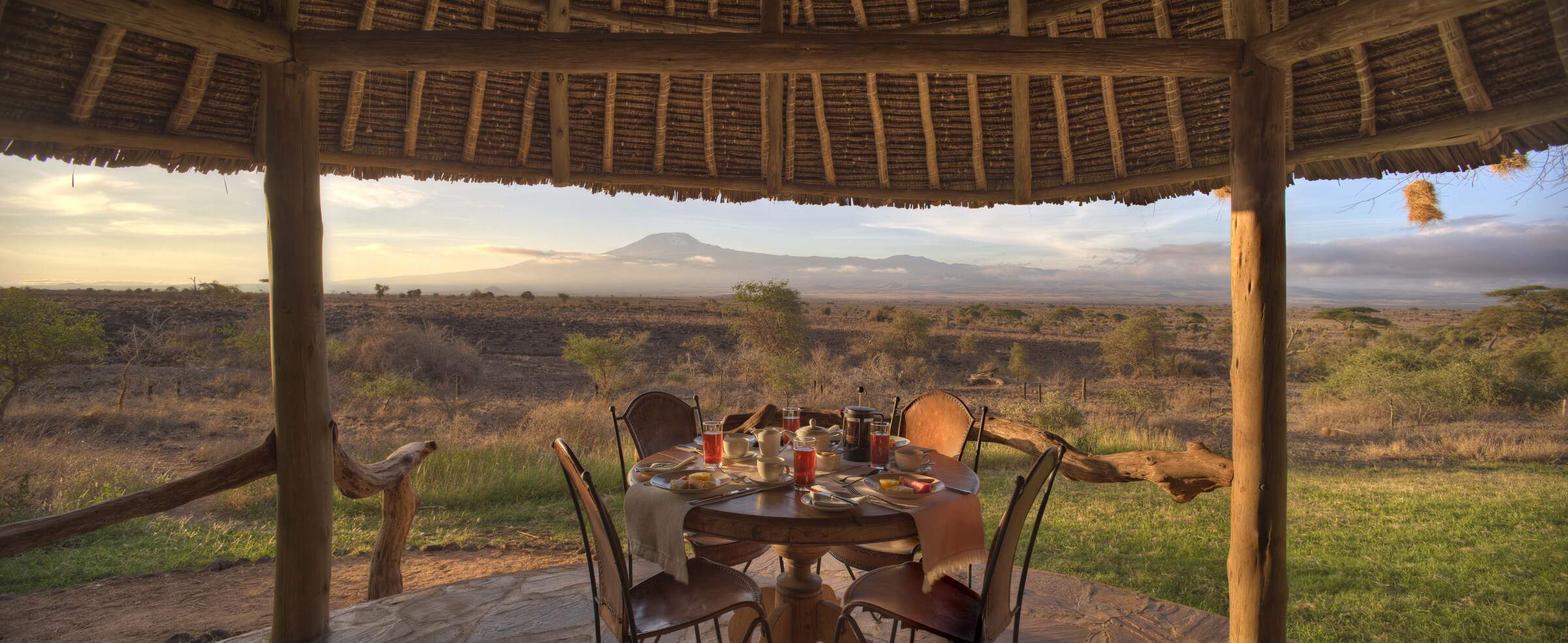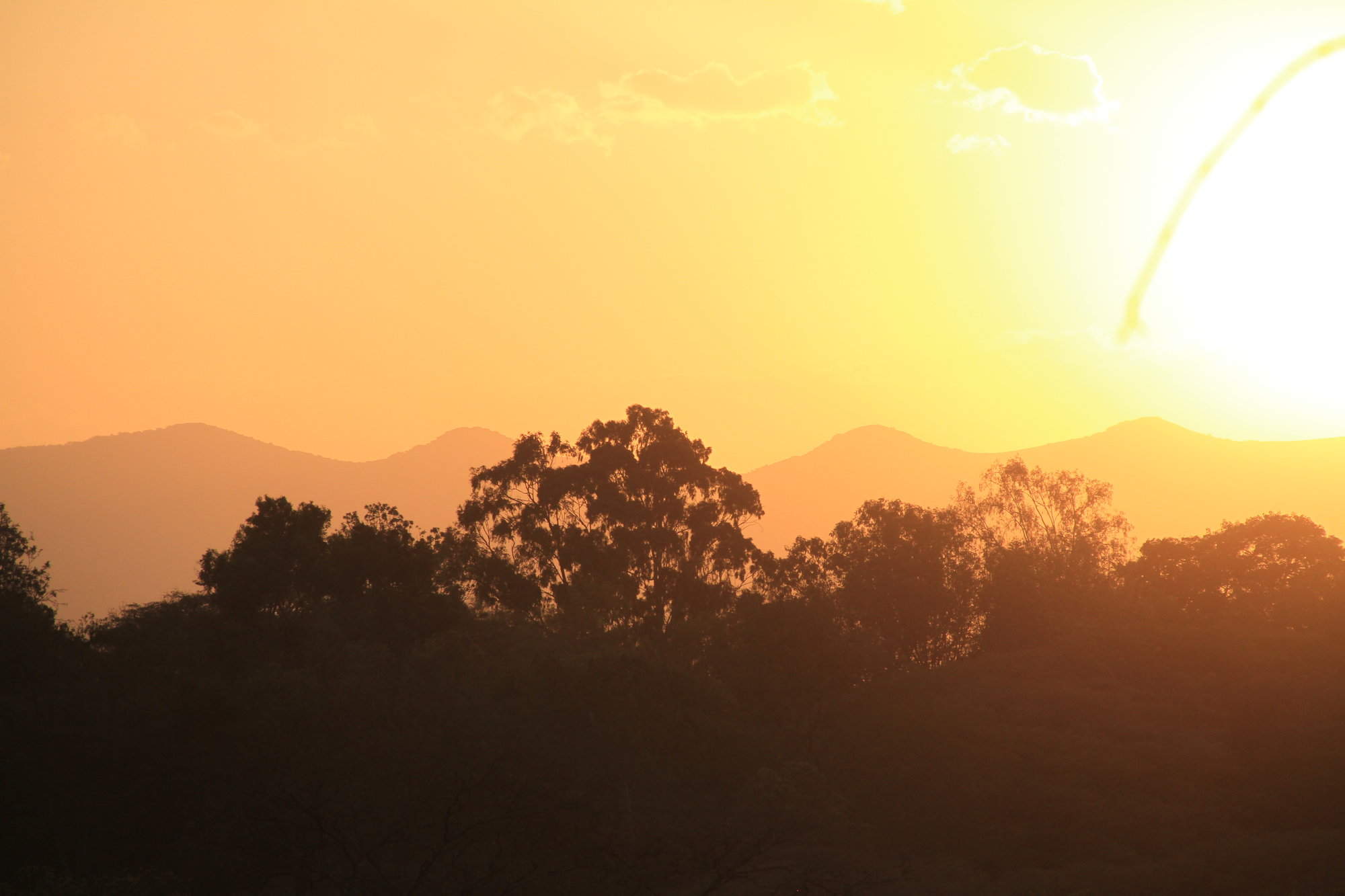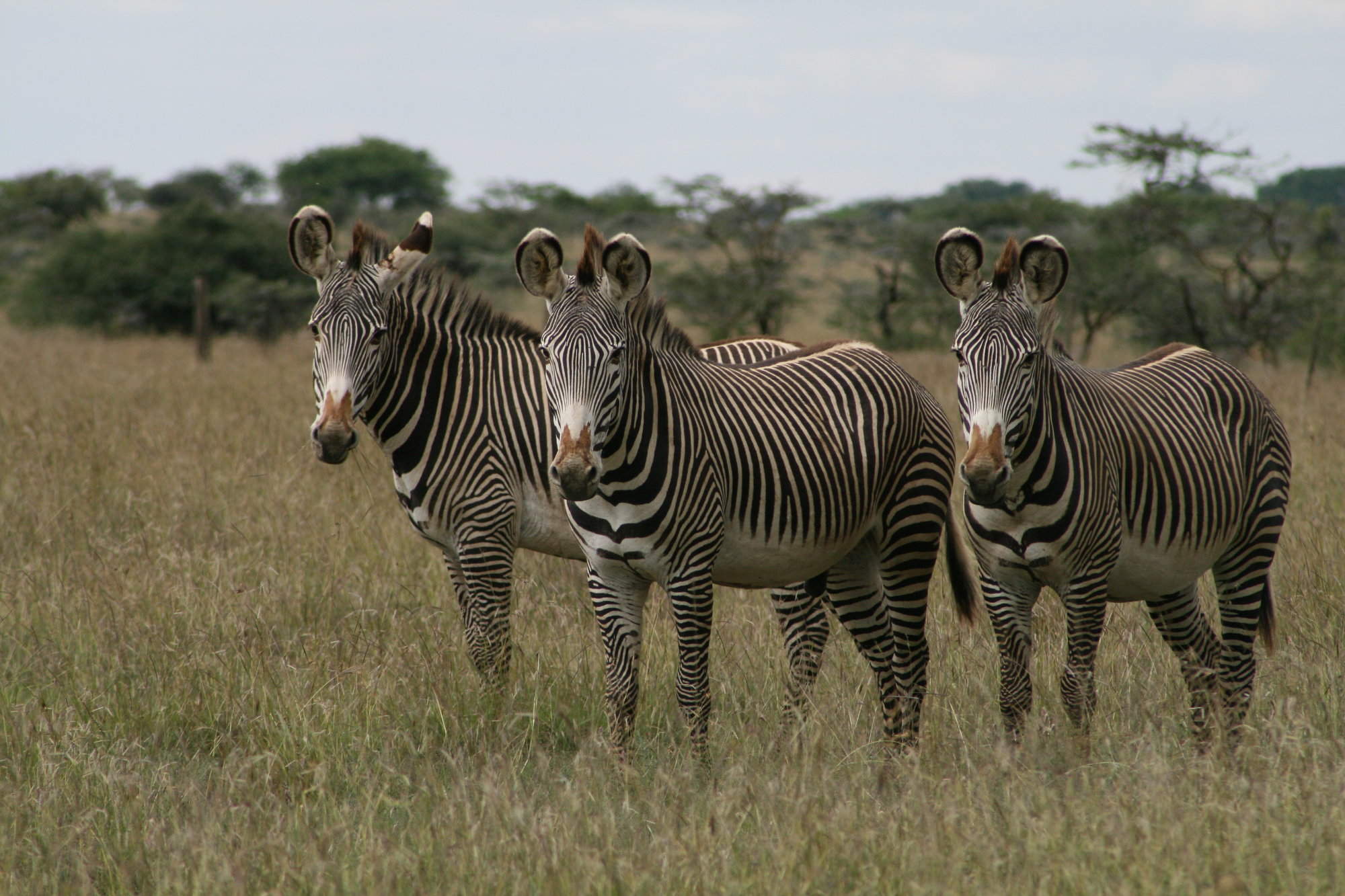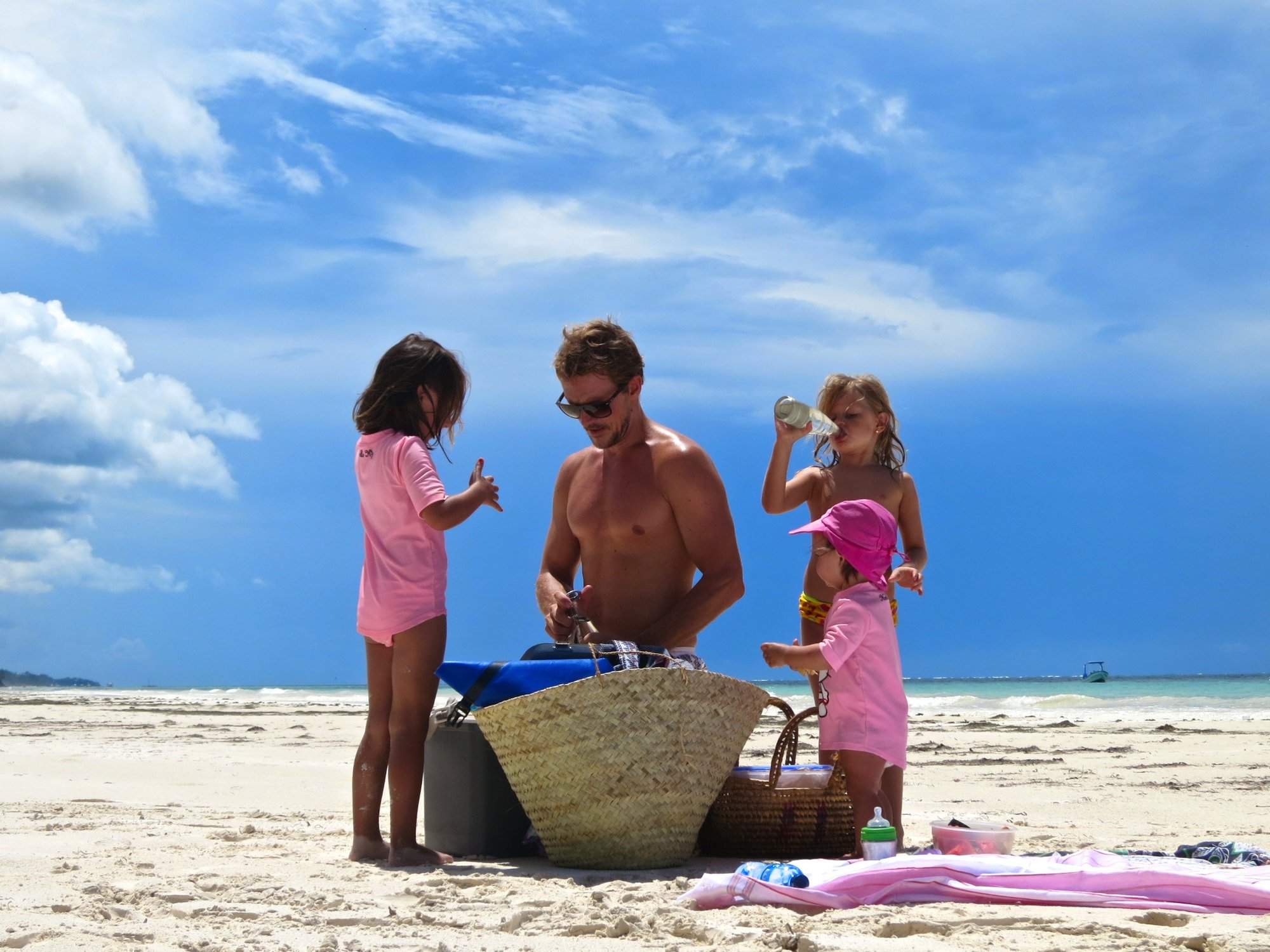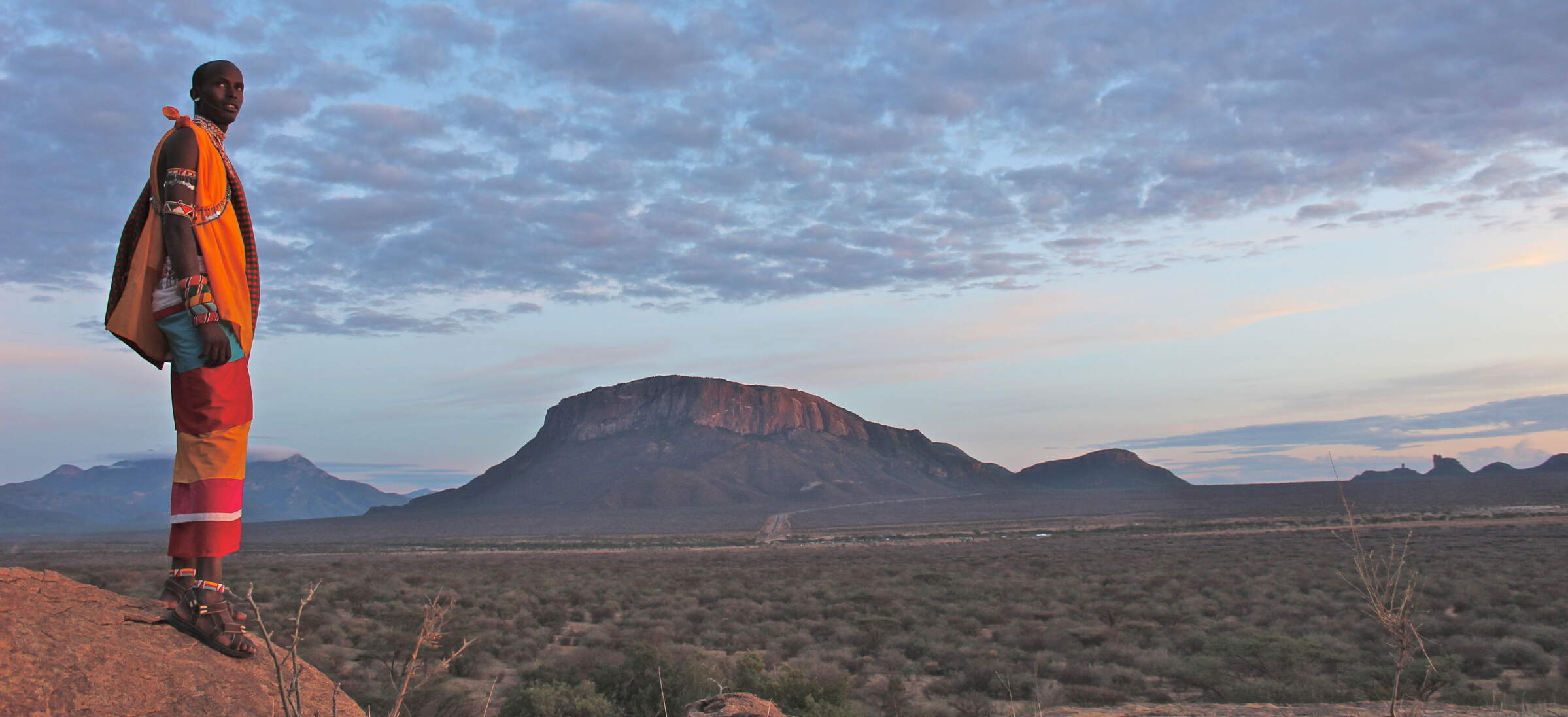Porini Amboseli Camp: Our full report
One of the earliest real eco-camps in Kenya, Porini Amboseli Camp first opened in 2001.
A low-impact, nine-tent camp, it is located on the Maasai-owned Selenkay (also spelled Selengei) Conservancy to the north of Amboseli National Park.The most outstanding feature of a safari here is the community aspect. There aren’t any time-serving, long-distance staff at Porini Amboseli: you’re looked after by local Maasai warriors and elders, generating income directly for their families. Apart from the manager and head chef, all the staff are Maasai.
This relaxed, unfenced camp feels small and homely, and is nicely spread out under the trees. The central areas at Porini Amboseli consist of a large lounge and dining tent, with sofas and armchairs. There’s a long table where guests usually eat with the manager and sometimes one or two senior guides. Alongside the dining table, drinking water, tea, infusions and coffee are available throughout the day.
Outside the lounge/dining tent, tables are set out for breakfast and lunch under the trees, where you can watch bare-faced go-away birds – and often vervet monkeys – hopping through the big trees overhead.
Behind the lounge and dining tent, there’s a small office tent, with the camp’s radio and communications equipment, and the ‘signal tree’ where you’re most likely to get some cellphone network and the staff leave their mobile phones to receive texts.
Nearby, a traditional-style hut houses the Porini Amboseli crafts shop. Here, the local community sell their jewellery, leather goods and traditional weapons at fixed, marked prices. Each piece is labelled with the maker’s name, and sales are carefully recorded to ensure they receive their due. It’s a refreshing change from the hustly atmosphere at some of the roadside ‘curio markets’ in Maasai-land, where it’s hard to browse in peace and prices start sky-high, expecting to be beaten down.
The ten guest tents at Porini Amboseli are very spacious, traditional canvas, cotton and vinyl set-ups, pitched directly on the flat, sandy ground and shaded by capacious flysheets.
On the veranda area of each tent there are canvas and wood directors’ chairs and a table. Inside, the tents are simply furnished with thick rugs, a double and a single bed, clothes hanging and storage space and a simple dressing table. The bathrooms, through a flap at one end, feature a washstand and basin with a good-sized mirror, a standard flushing toilet, and nicely presented toiletries. The showers are a good size, with wooden drainage floors, and supplied using the ‘bucket shower’ system: you’ll be asked when you want to shower and a member of staff, standing at the back of your tent, will haul a supply of hot water to the reservoir above your shower and call you when it’s ready to flow.
The camp’s drinking water is supplied in bottles, and washing water comes from a local borehole. Porini Amboseli’s green credentials are evident throughout : all their organic waste is composted and disposed of locally, while inorganic trash is bagged up and trucked back to Nairobi. The camp has a gold rating from Eco-Tourism Kenya.
The activities included at Porini Amboseli are day and night drives, bush walks, sundowners and a completely uncommercial visit to a nearby Maasai village (at no extra cost). The camp has constructed viewing platforms over three waterholes in the conservancy – one within walking distance of the camp – which can prove ideal for photographers.
There is very good birding here, and the camp has an outstandingly good bird guide, Wilson ole Kasaine, who can often be requested to accompany guests on walks and drives. And the elephant-viewing can be spectacular, especially in the wet season, when the herds roam far and wide away from the Amboseli swamps. The elephants of the Amboseli ecosystem are considered less aggressive than those of the Maasai Mara.
The 13,000 acre Selenkay Conservancy is bushier than much of the greater Amboseli ecosystem, and the wildlife is somewhat less habituated than in the national park, but game viewing (in the camp’s well-adapted vehicles or on foot) can still be good, with elephant, lion, leopard, cheetah, giraffe and zebra all present, as well as several less common species, including caracal, African wild cat, gerenuk, lesser kudu and striped hyena. There’s a porcupine den close to the camp.
Porini Amboseli is a sister camp to the more recently built Porini Mara Camp, Porini Lion Camp and Porini Rhino Camp with which it is often combined.
Our view
We think think Porini Amboseli Camp is one of the nicest camps in the Amboseli ecosystem. With its neatly swept, sandy paths padded by charming Maasai staff, the camp, shaded by venerable acacia trees, is like a tranquil oasis. Its green credentials and increasingly good gameviewing are further incentives to do a safari here.
Geographics
- Location
- Amboseli and the Chyulu Hills, Kenya
- Ideal length of stay
- 3 or 4 nights
- Directions
- Selenkay airstrip (charters) is about ten minutes from Porini Amboseli Camp. For arrivals by scheduled services to Amboseli National Park’s main airstrip, the transfer to Porini Amboseli takes around 90 mins, depending on whether you pause to watch wildlife en route. It can be a bumpy ride, but it is all part of the adventure!
- Accessible by
- Fly-and-Transfer
Food & drink
- Usual board basis
- Full Board & Activities
- Food quality
- At Porini Amboseli the dining tent (or ‘mess tent’ as it’s often called) is very flexible. You can have hosted meals with the camp manager, which is the norm, or if you want to dine separately that’s fine. Bush dinners and breakfasts are also available with notice the day before at no extra charge.
The food here is wholesome and plentiful, if not particularly fancy. The weekly rotating menu at the four Porini camps ensures that your meal selections won’t be repeated if you’re staying in more than one of their camps.
After early tea or coffee and biscuits, you come back from your first walk or drive of the day to a full breakfast – broadly English-style, including the usual cooked bacon, sausages and eggs to order – with cereals, fruit, juices and usually a special bread or pastry of the day.
Lunch tends to be a fairly light meal but with three courses, and several choices, for example cold gazpacho or spinach and feta tart, coronation chicken salad, couscous or quiche, and a dessert of banoffee pie or fruit kebabs and yoghurt.
With your sundowner, the nibbles (or ‘bitings’) vary every day, and could be vegetarian tempura, soy roasted cashews or grilled paneer, as well as the usual chips and nuts.
Dinner is the day’s main meal, with three courses and always a vegetarian option. The menu might start with carrot and coriander or butternut soup, followed by red Thai chicken curry, fish fillets or a very good roast chicken. Vegetarian options vary each evening, and include vegetable curries, stuffed pancakes, moussaka and stuffed bell peppers. Dinner always finishes with a good dessert – brownies and fudge sauce, baked apples and caramel sauce, or a fruit crumble for example. - Dining style
- Group Meals
- Dining locations
- Indoor and Outdoor Dining
- Further dining info, including room service
- Meals can be served at guest tents by advance arrangement.
- Drinks included
- Soft drinks, local beer, house wine and gin are included. Other drinks are not available and guests should bring any special requirements with them or order special requests in advance when booking.
Special interests
- Birdwatching
- Renowned Maasai birding guide Wilson ole Kasaine (one of the best birding guides in Africa) is on hand as one of the camp’s guides here, and with over 200 bird species in the camp's private Selenkay Conservancy, this is a great place for birdwatching in Kenya.
- See ideas for Birdwatching in Kenya
- Cultural experiences
- Most guests will visit a local Maasai village during their stay and you can interact with people and learn something about the Maasai way of life. With no fees charged and nothing sold, this provides genuine, brief insights into Maasai culture.
- See ideas for Cultural experiences in Kenya
Children
- Attitude towards children
- Children age 8 and above are welcome, although depending on other guests and the circumstances, younger children can sometimes be accommodated.
- Property’s age restrictions
- No under-8s
- Special activities & services
- Activities for children include Maasai spear throwing, animal tracking and meeting with local Maasai children.
- Equipment
- None
- Generally recommended for children
- The age restriction at Porini Amboseli means that children are expected to be mature enough to appreciate the environment and behave responsibly in it. The camp undoubtedly offers a very rewarding experience to children who are interested in wildlife, local culture and the African bush.
- Notes
- The atmosphere at Porini Amboseli is generally quite adult and there’s nowhere for lively children to let of steam – they will need to appreciate the bush environment and be prepared to behave accordingly.
Our travellers’ wildlife sightings from Porini Amboseli Camp
Since mid-2018, many of our travellers who stayed at Porini Amboseli Camp have kindly recorded their wildlife sightings and shared them with us. The results are below. Click an animal to see more, and here to see more on our methodology.

100% success

100% success

100% success

100% success

100% success

100% success

100% success

86% success

86% success

71% success

29% success

14% success

0% success

0% success

0% success

0% success

0% success
Communications
- Power supply notes
- There is a backup generator, but it is very rarely started.
- Communications
- The cellphone signal is relatively weak. There is no wi-fi in camp.
- TV & radio
- None
- Water supply
- Borehole
- Water supply notes
- A piped water supply provides water for the washbasin and flush loo. Hot water is provided for pre-dinner safari showers and early morning washes, but can be provided at any time on request. All cooking and drinking water is commercial bottled water that is brought into camp in big barrels. Three efficient bio-digesting septic tanks have been installed.
Health & safety
- Malarial protection recommended
- Yes
- Medical care
- Porini Amboseli Camp has staff trained in first aid and they undergo regular refresher courses. The nearest medical clinic is about 12km away (a 30-minute drive) at the village of Lengisi, where the Italian Dr Francisca is on call. In case of emergency, the airstrip close to camp is available for medical evacuation.
- Dangerous animals
- High Risk
- Security measures
- Maasai guards with spears guard the tents and guests. There are also two local APOs (Administration Police Officers) based in camp who are armed with automatic G3 guns. They are discreet and normally out of sight of guests. All guided walks are accompanied by an armed APO.
- Fire safety
- All staff are fire-trained and extinguishers are provided and placed at every tent and serviced every six months.
Activities
4WD Safari
Birdwatching
Cultural excursion
Guided walking safari
Night drive
Private activities
Extras
- Disabled access
- On Request
- Laundry facilities
- No laundry service.
- Money
- Valuables can be left for safe keeping in the manager's safe. but there are no safes in tents. Currency exchange is not possible.
- Accepted payment on location
- Rates are fully inclusive. There are no extra charges payable at camp and no facility to accept cash payments or credit card payments. Items from the shop can be paid for with cash and the funds are paid in full directly to the maker of the item.
Other lodges in Amboseli and the Chyulu Hills
Alternative places to stay in this same area.








